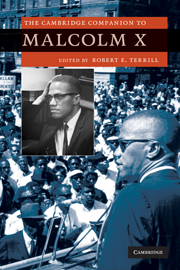Book contents
- Frontmatter
- Introduction
- 1 Malcolm X and Elijah Muhammad
- 2 Autobiography and identity: Malcolm X as author and hero
- 3 Bringing Malcolm X to Hollywood
- 4 Malcolm X and black masculinity in process
- 5 Womanizing Malcolm X
- 6 Malcolm X and the Black Arts Movement
- 7 Malcolm X and African American conservatism
- 8 Malcolm X and youth culture
- 9 Homo rhetoricus Afro-Americanus: Malcolm X and the “rhetorical ideal of life”
- 10 Judgment and critique in the rhetoric of Malcolm X
- 11 Nightmarish landscapes: geography and the dystopian writings of Malcolm X
- 12 Afrocentricity and Malcolm X
- 13 Malcolm X in global perspective
- 14 The legacy of Malcolm X
- Guide to further reading
- Index
9 - Homo rhetoricus Afro-Americanus: Malcolm X and the “rhetorical ideal of life”
Published online by Cambridge University Press: 28 May 2010
- Frontmatter
- Introduction
- 1 Malcolm X and Elijah Muhammad
- 2 Autobiography and identity: Malcolm X as author and hero
- 3 Bringing Malcolm X to Hollywood
- 4 Malcolm X and black masculinity in process
- 5 Womanizing Malcolm X
- 6 Malcolm X and the Black Arts Movement
- 7 Malcolm X and African American conservatism
- 8 Malcolm X and youth culture
- 9 Homo rhetoricus Afro-Americanus: Malcolm X and the “rhetorical ideal of life”
- 10 Judgment and critique in the rhetoric of Malcolm X
- 11 Nightmarish landscapes: geography and the dystopian writings of Malcolm X
- 12 Afrocentricity and Malcolm X
- 13 Malcolm X in global perspective
- 14 The legacy of Malcolm X
- Guide to further reading
- Index
Summary
The distinction between poetry and rhetoric is as old as Western culture itself, yet attempts to define these two forms of discourse in opposition to each other rarely offer a coherent connection between theory and practice. In theory, poetry is understood in terms of its ability to connect us to an abstract human condition, and is evaluated on the basis of aesthetic quality. Rhetoric, on the other hand, is theorized as the ability to discover the means of persuasion in the context of concrete social situations, and its quality is revealed most powerfully in its ability to produce an observable effect on such situations. Poetry relies upon stylistic devices to move us toward transcendence and being, while rhetoric invokes elements of style to move us toward action and becoming. In theory these distinctions make sense, yet in practice they often break down. One tradition of discourse in which this is especially true is in the communicative forms and practices of African American culture. Within the realm of black rhetoric and aesthetics, form and function are rarely understood in opposition to one another. Indeed, African American communication offers an integrative vision of style that disrupts the age-old separation of poetry as an art of being and rhetoric as an art of becoming. That vision of style is expressed perhaps most powerfully in the rhetoric of Malcolm X. He was an orator whose use of language reconciled the tensions between poetics and rhetoric, between being and becoming, that lay at the heart of Richard Lanham's “rhetorical ideal of life.”
- Type
- Chapter
- Information
- The Cambridge Companion to Malcolm X , pp. 113 - 124Publisher: Cambridge University PressPrint publication year: 2010



